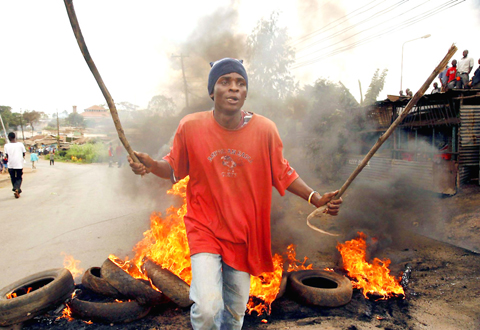Kenyan leaders were under pressure yesterday to resume talks on forming a coalition government in a bid to end a devastating political crisis, a day after talks collapsed and hundreds demonstrated to demand a new Cabinet.
The much-delayed unveiling of a national unity government is a key step in implementing a power-sharing deal aimed at quelling the deadly violence that broke out following Kenya’s disputed December polls, killing at least 1,500 people and displacing hundreds of thousands.
Many Kenyans have already reacted angrily to last week’s announcement that feuding factions had agreed on a 40-member Cabinet — a number of portfolios the country’s wobbling economy can ill afford.

PHOTO :EPA
The lengthy disagreement over the attribution of key portfolios has fanned popular anger. On Tuesday hundreds of protesters chanted some of the same slogans heard during opposition marches in the immediate aftermath of the Dec. 27 elections.
Newspapers renewed a call to Kenyan President Mwai Kibaki and Orange Democratic Movement leader Raila Odinga — slated to be prime minister — to agree on the Cabinet composition in the spirit of the power-sharing accord that was mediated by former UN chief Kofi Annan.
The two leaders have failed to agree on sharing the Cabinet — notably the ministries of justice, interior, foreign affairs, energy and local government.
“The disagreement goes to the question of whether the proposals made by the partners follow the letter and spirit of the national accord and whether any of the parties has backed away from concessions, frustrating efforts to make progress,” the Standard newspaper said in an editorial.
“Consensus is still possible on the most difficult of issues preventing the announcement of a new coalition government,” the daily said.
But Odinga has said he will only resume talks with Kibaki after he replies to a letter sent on Monday demanding dissolution of the current 17-member Cabinet and a 50-50 sharing of Cabinet posts.
On Tuesday, US Secretary of State Condoleezza Rice urged the fueding leaders to build a coalition Cabinet.
Churches and civil groups have threatened mass action if the parties fail to reduce the new Cabinet to 24 members, arguing the country could ill afford 40 ministers.

The paramount chief of a volcanic island in Vanuatu yesterday said that he was “very impressed” by a UN court’s declaration that countries must tackle climate change. Vanuatu spearheaded the legal case at the International Court of Justice in The Hague, Netherlands, which on Wednesday ruled that countries have a duty to protect against the threat of a warming planet. “I’m very impressed,” George Bumseng, the top chief of the Pacific archipelago’s island of Ambrym, told reporters in the capital, Port Vila. “We have been waiting for this decision for a long time because we have been victims of this climate change for

Rainfall is expected to become more widespread and persistent across central and southern Taiwan over the next few days, with the effects of the weather patterns becoming most prominent between last night and tomorrow, the Central Weather Administration (CWA) said yesterday. Independent meteorologist Daniel Wu (吳德榮) said that based on the latest forecast models of the combination of a low-pressure system and southwesterly winds, rainfall and flooding are expected to continue in central and southern Taiwan from today to Sunday. The CWA also warned of flash floods, thunder and lightning, and strong gusts in these areas, as well as landslides and fallen

MASSIVE LOSS: If the next recall votes also fail, it would signal that the administration of President William Lai would continue to face strong resistance within the legislature The results of recall votes yesterday dealt a blow to the Democratic Progressive Party’s (DPP) efforts to overturn the opposition-controlled legislature, as all 24 Chinese Nationalist Party (KMT) lawmakers survived the recall bids. Backed by President William Lai’s (賴清德) DPP, civic groups led the recall drive, seeking to remove 31 out of 39 KMT lawmakers from the 113-seat legislature, in which the KMT and the Taiwan People’s Party (TPP) together hold a majority with 62 seats, while the DPP holds 51 seats. The scale of the recall elections was unprecedented, with another seven KMT lawmakers facing similar votes on Aug. 23. For a

All 24 lawmakers of the main opposition Chinese Nationalists Party (KMT) on Saturday survived historical nationwide recall elections, ensuring that the KMT along with Taiwan People’s Party (TPP) lawmakers will maintain opposition control of the legislature. Recall votes against all 24 KMT lawmakers as well as Hsinchu Mayor Ann Kao (高虹安) and KMT legislative caucus whip Fu Kun-chi (傅崐萁) failed to pass, according to Central Election Commission (CEC) figures. In only six of the 24 recall votes did the ballots cast in favor of the recall even meet the threshold of 25 percent of eligible voters needed for the recall to pass,